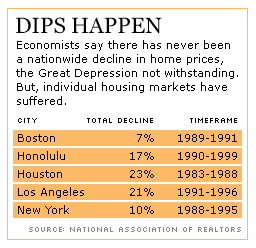
Posted on 02/01/2006 8:49:13 AM PST by Toddsterpatriot
Was there some fact in that post that you were trying to get across? Maybe highlight it next time? Underline? Something?
Please, post the right numbers and the right conclusions. Just source them. Not your feelings.
You mean like investing in real estate and the stock market? Gee, thanks for the tip, Tex.
" they should be investing in their own investments not tied to a corporation or politician."
"the stock market crash'
You seem to be awfully paranoid, I suggest aroma therapy.
Paranoid yeah you tell yourself that when the market tanks because you were an idiot and didn't diverify investment types.

Snowballing debt is a way to accelerate the paying down of debt over time.
If your monthly debt service equals $1500, for example, you would always pay $1500 towards debt.
As you pay off certain notes, the amount paid toward that note would be rolled into the payment of another note until it was paid off, and so on.
Pretty soon you are paying $1500 towards one note (which you might have previously only been paying $500 against), and that last debt will be eliminated that much more quickly.
All of this assumes, of course, that you are not accruing any additonal debt during the process.
Read the article I posted it shows the realtionship between median incomes and median house values.
I'm sorry, you'll have to show me where I said either of those things. Just to be clear, is a house an asset? Is a stock an asset?
"Housing debt is getting worse
With $6.8 trillion in mortgage debt at year-end, banks now own 45 percent of our homes, the highest level on record. " (Same article)
Great, fabulous. Where does it mention median home equity?
In Boston, the median home sells for 3.3 times median income. In San Diego it's 5.2 times and in San Francisco 4.2 times.
That's right, it doesn't. Thanks again for adding......nothing to the discussion.
Oh my God, this must mean that we own 55 percent of our homes. Still more than zero. Thanks, again.
And you're back to averages missing completely why the higher debt is a problem.
You just keep on buying numbers be damned.
Yes of course bcause every IRA and 401K allows shorting and trading on margin.
Assertion: Credit-market debt is too high. “Total credit market debt as a percentage of GDP rose from around 120% in 1980 to over 300% at present,” according to Marc Faber’s April 20 Gloom, Boom and Doom Report.
Response: It makes sense for debt (and assets) to grow faster than GDP in a flexible, financially innovative economy. Faber’s 300 percent figure includes corporate debt, much of which is cascading (for example, an auto buyer borrows from a financing company which borrows from the credit markets). Other causes of increasing U.S. debt are low interest rates and the increase in home ownership. The issue is not so much the level of debt but whether sufficient capital formation is taking place in a market-based way to maintain growth. I think it is.
The third quarter of 2005 was also the first since 1947 when net national savings as a whole went negative.
The official savings rate measure does not consider economic gains from patents, innovation, capital gains or land appreciation. Since 1997, Americans have cashed in more than $3.5 trillion in capital gains.
Yes, somebody has to have the money to finance the nation's ongoing shopping spree. Increasingly, however, it's not Americans, but their foreign creditors.
The fact that Americans have per capita assets of $89,800 makes us the top saving country in the world. (Japan is second at $76,900 per head.)
Tonelson is no different than Krugman or Paul Craig Roberts in that all of them intentionally ignore the facts to advance their anti-trade/anti-Bush agenda.
15 posted on 01/05/2006 10:10:58 AM CST by Mase
Disclaimer: Opinions posted on Free Republic are those of the individual posters and do not necessarily represent the opinion of Free Republic or its management. All materials posted herein are protected by copyright law and the exemption for fair use of copyrighted works.